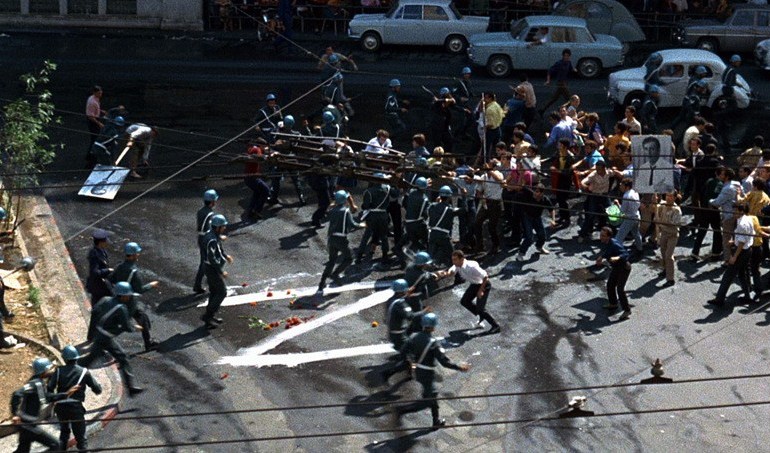On May 22, 2020, Greek politician Grigoris Lambrakis was struck over the head with a club by two men after delivering an anti-war speech to hundreds of supporters. His death in the hospital five days later sparked an intense protest against the right-wing Greek government and inspired thousands of Greek youths to join leftist political organizations. With his third feature film Z (1969), Greek director Costa-Gavras provides a thinly fictionalized account of the Lambrakis assassination and its aftermath under the guise of a fast-paced thriller. The widespread success of his film echoes the worldwide political turbulence of the 1960s and the frustration of “New Left” movements at government and military suppression. What’s so shocking about Z isn’t how important it was 50 years ago; it’s how relevant it remains today.
Z opens with a military meeting, where a scientist dully explains the different times a plant can be infected by mildew. The credits roll over images of uninterested generals and majors; one shot includes the title, “Any resemblance to real events and dead or living people is not a coincidence. It is INTENTIONAL.” The presentation on mildew ends, and the scientist is replaced by a major. The major passionately describes the government’s program to prevent any “ism’s” from infiltrating the people (much like mildew infects a plant): communism, socialism, anarchism. The comparison of ideologies to diseases sets the stage for the rest of the film: the police and military see themselves as “antibodies” designed to eradicate any “disease-carrying” individuals, no matter the human cost.
From there, the film follows the Deputy (never named), a pacifist politician and former doctor, as he arrives in the city for a nuclear disarmament rally. Before the actual assassination, there are attempts to suppress the Deputy’s speech: venues cancel or refuse to host the rally, supporters handing out pamphlets are beaten up, and a close friend is attacked and nearly killed by protesters. After finishing his vehement speech, the Deputy is hit on the head with a club by a man in the back of a truck, a perceived hit-and-run. His death is subsequently investigated both officially by the Examining Magistrate and unofficially by a young, overeager photojournalist. Their combined efforts lead to the discovery that high-ranking officials in the Greek police and army worked together with a right-wing extremist group to attack the Deputy and his supporters. Despite the warnings given to him to relent, the magistrate indicts four military police officers along with several members of the extremist group.
Even with the victory of exposing the criminality within the Greek military, Z reminds us how difficult it is to change a corrupt, crooked system. The epilogue of the film shows what happened after: how the charges against the officers were quickly reduced or dropped, how the magistrate is removed from the case and several associates of the Deputy die or are deported, how the military seizes power in a sudden coup. The new government bans modern art, pop music, new mathematics, and even the letter “Z” (a term used by protestors that translates to “He Lives!”). When Z was released in 1969, the military dictatorship in Greece was still in power and would remain in control for another five years.
Costa-Gavras (short for Konstantinos Gavras) lived in Greece during his childhood but left for France to pursue higher education since his father’s Communist Party membership prevented him from attending university there. Even though he had made two feature films beforehand, Z put Costa-Gavras on the map and defined his filmmaking career for the next several decades. The 1960s was a decade fraught with political strife: the counterculture movement in the United States, the student uprisings in France, the Cultural Revolution in China. For people around the world, Z struck a hidden nerve and went on to become a critical and commercial success, even winning the Academy Award for Best Foreign Language Film. Costa-Gavras went on to make films like State of Siege, Missing, and Eden in West, dealing with issues ranging from U.S. involvement in Latin America to the current immigration crisis in Europe. His films combined contemporary global politics and commercial entertainment and made statements critiquing corrupt systems of government across the globe.
Costa-Gavras’s Z also helped bring forth a more modern political thriller. Previous works of that genre included Alfred Hitchcock’s The Man Who Knew Too Much and John Frankenheimer’s The Manchurian Candidate; both films used contemporary political issues and spun a fictional story out of them. Z, on the other hand, adopted real-life events under the thin guise of fiction. Its purpose was explicit: to make an impassioned statement, to inform and enrage people about injustices, violence, and corruption occurring thousands of miles away. Its influence quickly spread to Hollywood, and more political thrillers engaged with real-life events began premiering and becoming cultural phenomenons. Alan J. Pakula’s All the President’s Men describes the investigation that uncovered the Watergate scandal, coming out a mere two years after Nixon’s resignation. Last year, Steven Spielberg’s The Post got nominated for several Oscars; even though it was based on an investigation from 1971, it championed the importance of a free press and implicitly challenged the current presidential administration.
Even ignoring its importance within the political thriller genre, Z‘s legacy extends to today’s global politics. Around the world, there is still government suppression of “dangerous” ideologies and political protests that inflame in brutal violence. In August 2017, a rally of white nationalists collided with counter-protesters in Charlottesville, ending in dozens of people injured and one young woman brutally murdered. Throughout many different countries today, the government is tightly controlled by an oppressive regime that censors modern art and progressive ideas. The recently re-elected president of Venezuela is currently being challenged by the opposition for invalid election results, and the president has, in turn, charged the crisis as a coup led by the United States to topple him and gain control of the oil reserves. Regardless of where one stands politically, there’s no denying that the events Z depicts are still happening today, albeit in different forms. Costa-Gavras’s film doesn’t just work as an entertaining, suspenseful drama; it bleakly examines the dangers of corrupt government and the tragic futility of how much ordinary citizens can accomplish in seeking justice.
To help us continue to create content, please consider supporting us on Patreon: https://www.patreon.com/filmera


